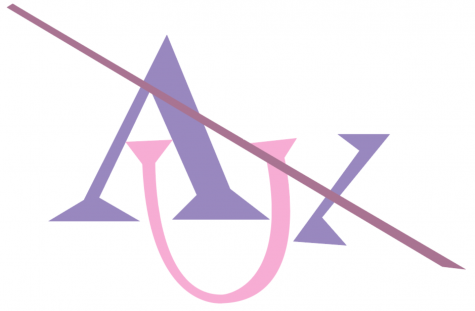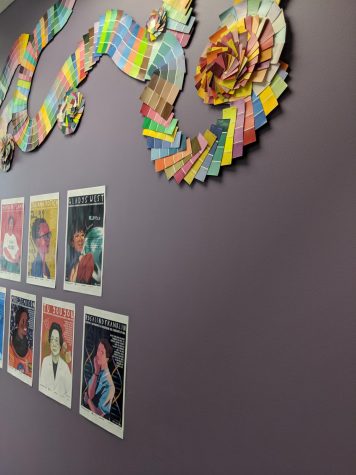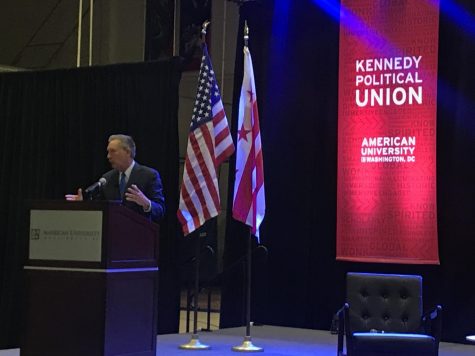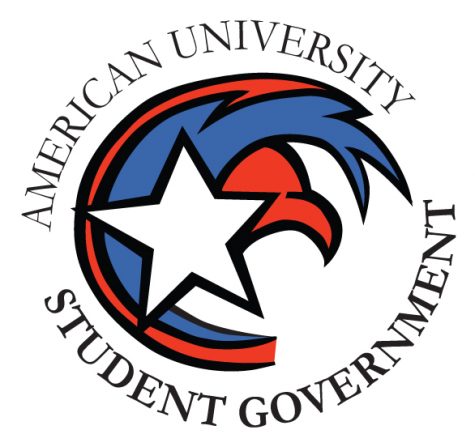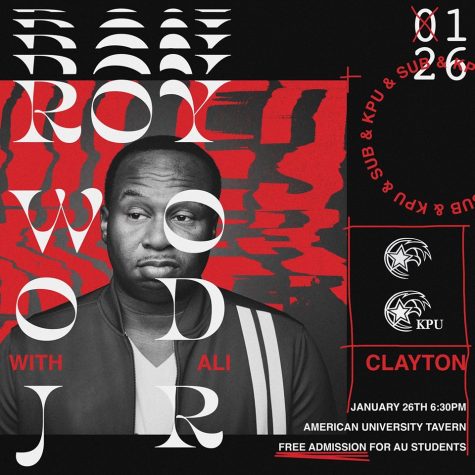The New American Poet: Kyle Dargan
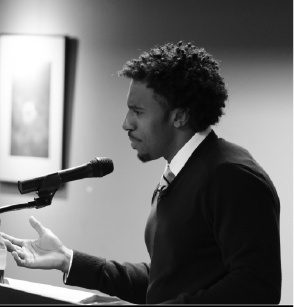
Kyle Dargan is a published poet, an associate professor of literature and creative writing and the director of the creative writing program at American University. AWOL sat down with him to discuss how poetry can challenge American norms, bring color to a community and amplify the voices of unheard DC youth.
You’re not only an AU professor, but you’re an accomplished published poet. What would you say your own poetry tends to focus on?
Right now, the writing is focusing a lot on the concept of America, and something I’m thinking about—functional disillusionment. It may be something of a Millennial attitude. And I call it functional disillusionment in the sense that you express that you really don’t believe that the way things are currently set up is working for the majority of people. And you don’t say that to elicit pity, or to be emotional, but what you’re saying is, “I don’t have faith in this.” I think that gets people to respond in a stronger way rather than criticism or whining, not that those aren’t valid in their own way.
But I think that there’s a certain impulse that comes with knowing that someone has lost faith in you that may spur you to try to do something different. And I feel that there are many people, particularly young people, in the country right now who feel they don’t have a reason to believe that the system has their future and their best interests in mind. I don’t think there’s any way you can really believe that as a young person right now.
What made you decide that you wanted to pursue poetry in your professional life?
I don’t consider poetry a profession. It’s a passion, an obsession, not a profession. I teach—that’s my profession, that’s my job. What I do in terms of writing, I just do that out of a wholly personal drive. I’m never doing it thinking, “Oh, I’m setting myself up to benefit some way professionally or financially from this.” I also think it’s kind of foolish for a poet to think that way anyway. Nowadays, novelists aren’t making a living off of writing novels. So if that’s the case, as a poet, which has never been very commercially viable genre in this country—at least not for many people, maybe for a select few—I don’t think you can enter it thinking that you’re going to make that kind of life.
So, you’re heavily involved in the DC literary scene. Is there a strong sense of community among DC writers or artists?
I think everyone here knows that poetry will never have top billing in the city. Literature will never have top billing in the city. You’re always competing with government. So in that way, it’s sort of a nice ego check. If you’re here as a writer, you can never think too highly of yourself because you know that C-SPAN is always going to trump whatever you’re doing. And that’s fine. You don’t write to compete with the speaker of the house or the president. You write to provide color and texture to a world which, in many ways in DC, is very surface. The machinations are very surface. Most people don’t know what life on the ground in DC is like. I think sometimes that’s true for even AU students who don’t make it away from this part of town very much. So I think that’s what a lot of people here are trying to do: give a sense of just what it’s like to be a human being in Washington, DC, as opposed to just someone who feeds the government and allows it to function.
Can you tell me about your current work with young writers in Eastern DC through Writopia and 826DC?
Writopia Labs is a great organization. They work with youth writers and they partner with Scholastic to run the Art & Writing Awards every year. They also now do the vetting for the National Student Poets Program, which I worked on with the President’s Committee on Arts and Humanities. I was working with them reviewing submissions a few years ago and I noticed that these kids were doing great writing, but so few of the submissions, and particularly the really good ones, were from DC, and, in particular, Eastern DC. I went to give a keynote at the awards ceremony, and I noticed that when all of the kids were coming up, it was the same thing. It was mostly kids from Virginia and maybe certain select DC schools that you would expect. I said to myself, “What could you do to get more young writers from southeast DC?” And there isn’t an issue of not having enough resources going into the school, because you have people like Writopia, 826DC, Shout Mouse. But I think sometimes people need a little additional incentive.
So I started the Edward P. Jones scholarship for young writers in Ward 7 and Ward 8 to give them something to aspire towards, to say, “I want to win that thing,” which of course isn’t the reason for art, but sometimes it’s a good reason to start. The main thing is that these kids come on stage at the award ceremony and they get their own award, they get their own recognition, sometimes their friends and family are there, and the hope is that inspiration and ambition bleeds out through the community gradually. That’s just the hope to let more kids on that side of town know that we’re interested in your voices, we’re interested in what you want to say, and we’re here to support and recognize you for that if you want to give it a shot.
I tend to have more direct interaction with students through 826DC, because they do a lot of student publishing projects. For many of them, it’s the first time they’ve ever had anything published. So it’s sort of the same idea of an incentive. You can say, “I get to be a published author” at 16, 17, 18. It’s all geared towards modeling and encouraging students to express themselves.
I think sometimes, what often happens is you hear someone say, “I want to be a voice for the voiceless.” No one’s voiceless. It’s just that some people have more opportunity to have their voice amplified and their words disseminated than others. Rather than going in and saying, “I need to speak for these people”— no you don’t — you just need to enable them and give them opportunities to do that themselves. So that’s what I want to do for kids on that side of town. I also think that people just assume that they know what they’re about. And you really don’t. And you read some of those narratives and you see some of those poems and you know what those kids are dealing with. It just gives you a completely different perspective on what it’s like to be a young person in Eastern, Southeast DC, and what they may need. I think too often, it’s a top-down conversation.
You mentioned before the National Student Poets Program, which is a part of the President’s Committee on the Arts and Humanities. This helps bring students into the White House to share their poetry?
The National Student Poets do have an opportunity to come and read at the White House and meet Michelle Obama. And it’s very life-changing in ways I couldn’t imagine, meeting the first lady as a [teenage] poet. The goal is really to have these kids be ambassadors for poetry. [They] can model for [their peers] the importance of poetry and the power of poetry and the power of writing.
Why do you think it’s important for the President and for our government to encourage the arts and humanities?
Important? I don’t know. I think it’s nice to have a president and a first lady who appreciate the arts because the arts bring us back to our humanity. And I think that’s what the government is about, it’s allowing people to have equal access to their humanity. Art reminds you of the humanity you’re trying to enable; otherwise people just become numbers and statistics and social security sequences. I think art reminds you of the face. And it’s good to think we should have someone in the White House who understands and recognizes that people have faces.
You’re currently developing an intergenerational art initiative. I was wondering if you could tell me more about it?
I’m big on institutional knowledge. I think part of the point of humanity and how we record ourselves is that you don’t have to start from zero every generation and learn everything over; we build on our mistakes. So I want to do something that encourages intergenerational dialogue.
The idea would be to get at least three different generations represented by people in a room. Let them have an open conversation about what their lives are like and have them respond to each other and record all of that. And then have an artist make a piece of art that responds to and incorporates some of the different themes that come up in the conversation. I would like it to take on whatever medium the artist is willing to bring to the project and just be willing to showcase this stuff in one place, and you have all these different intergenerational conversations represented by all these different pieces of artwork.
While you’re teaching and doing all these projects, you’re also the founder and editor of Post No Ills Magazine.
Post No Ills is at least around 10 years old now. Back when I started, there was a palpable decline in the amount of book reviewing in newspapers, which is generally the place where you would go to find book criticism. It presents a problem because there are people that don’t know where to start with literature—not everyone is an English major. Some people actually do want to read, but they don’t know where to start. So I started Post No Ills. It’s an online magazine, but my focus from the beginning is always just criticisms and interviews. We’re all about providing context for all this new writing that’s being produced.
How has living in DC and immersing yourself in this literary scene affected your work and how you view the arts in general?
I think a lot of people take the arts for granted in DC because so much of it is funded by the government. So if you live in the District or if you live in the area, I think your perception of worth may be skewed a bit because you have all this access to all this wonderful art for which you never actually have to see yourself exchange money.
I think there’s a space for a lot more subversive art. The punk scene in the ‘70s and ‘80s, a lot of that started in DC, which most people think is a straight-laced white-collar town. But there’s a lot that happens beneath that government veneer.
I’ve grown so much here as an artist just because of stuff I would’ve never expected to come in contact with. I partnered with organizations I would’ve never known or heard of if they hadn’t reached out to me, and I think that’s just one of the advantages of so much going on beneath the surface. If you’re willing, you can grow a lot.


